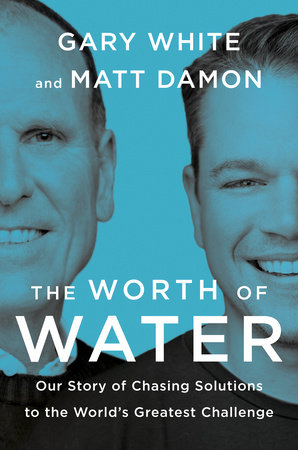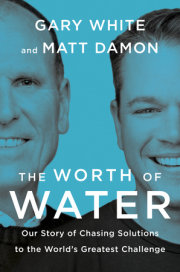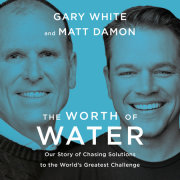Chapter 1: What the Hell Is the "Water Issue"?
POV: Matt Damon
I've spent most of my life telling stories on-screen, not on the page-so as I was thinking about how to begin this book, I thought about how I'd start the movie. We'd fade in on a hut I visited in rural Zambia in 2006. I can still see it clearly in my mind: earthen brick walls, dirt floor, thatched roof. The landscape around it was usually dry, but because this was April, the end of the rainy season, the ground was covered, in parts, with a thin blanket of green. I was sitting outside the hut, waiting for a teenager to get home from school.
I was in Zambia because Bono-the rock star who spends his spare time fighting to end extreme poverty-had been pestering me to go. "Pest" is Bono's word. He wears it like a badge of honor. He takes pride in getting people-politicians especially, but others, too-to do things they wouldn't otherwise do, if he wasn't pestering them. The guy is really good at it. Bono believes that seeing poverty up close can change a person's priorities, can compel them to go out and do something about it. So he and his colleagues at the organization he started, DATA-which would eventually become the ONE Campaign-had been pressuring me to join them on a trip to Africa. He'd been pressuring me with the zeal of a telemarketer. He was not going to take no for an answer.
My answer wasn't no, exactly. I just had a lot going on in my life. My wife would be seven months pregnant at the time of the trip, and I had only a small window of time before my next movie. So I told Bono it just wasn't a good time. He looked at me and said, "It's never going to be a good time." Which, of course, was totally right.
I had no grand illusions about the point of going on this trip. It's not like I'd be changing anybody's life. Bono likes to say that there's nothing worse than a rock star with a cause, but an actor with a cause is a close second. I winced at the mental image of me walking through the bush or an urban slum somewhere, looking concerned, and then flying home to my comfortable life. But then I thought: that's an even dumber excuse for not going than "I'm busy." The more I thought about the trip, the more I realized that I wanted to go and meet some of the people who live in these extremely poor places, to see firsthand the challenges they face, and to figure out whether there was something I could be doing to help. So I told Bono I'd go, and my older brother, Kyle, agreed to come along, too.
The trip was about two weeks long. It took us to slums and rural villages across South Africa and Zambia. DATA had set it up like a college mini course. Each day, we learned about a different challenge that kept people from breaking the cycle of poverty: underfunded health systems, the challenges of life in a slum, the HIV/AIDS crisis. We read briefing books about each issue, visited organizations that were trying to tackle them, and, most important, talked with the people.
On one of our last days in Zambia, we were going to learn about water. It wasn't clear to me why. I understood why we had been focusing on HIV/AIDS and education-these were issues that you read about in the news, issues that people talked about or signed petitions about or donated in support of. But when I heard we'd be spending the day on the "water issue," I wasn't sure what issue that was, exactly. I guessed the water was contaminated.
Then I read my issue brief. It said, yes, the water was contaminated-so much so that waterborne diseases were killing a child about every twenty seconds. But the water was also hard to access. There were no water pipes in these villages, no water taps in people's homes. Somebody had to go get the water and bring it back, and that somebody was almost always a woman or a girl. This was their responsibility: to walk as far as necessary to whatever water source they could find and fill their plastic jerrican, a five-gallon water jug that weighs more than forty pounds when full. Then they turn around and carry it home. And the next day they wake up and do it again.
To see what that was like, we drove four hours from Zambia's capital, Lusaka, to a village with a well that a partner of DATA'S helped build. The staff knew of a family who lived close to the road. Their daughter Wema was fourteen, and every day after school she walked to the well to get water for her family. She'd agreed to let us walk with her, but when we arrived at her home, it was empty. Not just the home, but the whole area. There was no village center that I could see; all the huts were spread out. It was very still, very quiet, and we just sat there for a while, waiting.
Eventually we saw Wema coming toward us down the path. She was carrying books and wearing a simple blue dress that looked like a school uniform. She greeted us shyly, then put down her books and went to fetch her family's jerrican.
At first, as we started walking to the well, the conversation was awkward. Which wasn't really a surprise. Wema, who walked alone to this well every day, suddenly had an entourage of trip coordinators and village officials, plus an overeager movie actor. She and I didn't speak the same language, so we had to rely on an interpreter. Still, as we walked, everybody else hung back a bit, giving us some space. Her responses to my questions were pretty short, but after a while we both relaxed a little, and even the silences felt natural enough. It was a peaceful walk down a country road.
After half an hour or so, we arrived at the well. Somebody suggested I try my hand at it. I had just finished filming one of the Jason Bourne movies, so I thought I was in pretty good shape. But pumping water from this well was harder than it looked. Wema and I laughed as I struggled with it. She had this incredibly practiced way of working the pump and then hefting this big, heavy yellow can up onto her head, where she kept it balanced with the help of one hand. This was easy to admire until you remembered (if you'd let yourself forget) that this was work for her: an inescapable, essential chore.
On our way back, it started to rain. Nobody said anything about it; we just kept walking. There's something about succumbing to the rain and accepting you're going to get soaked that loosens people up. The conversation got easier. I asked the girl if she wanted to live in the same village when she grew up. She smiled at me, a little shy again-as if she was debating whether or not to answer. After a moment, she did. "I want to go to Lusaka," she said, "and become a nurse."
I had this feeling that she mostly kept this ambition to herself. I wondered if her parents even knew, and if she'd hesitated to tell me because I might tell them. It was no small thing for her to have this dream-to think about leaving the place she'd always known, to head out on her own and show what she could do. It really resonated with me. And look, I know it's a clichŽ to meet someone halfway across the world whose life is dramatically different from your own, and suddenly see yourself in them-but I did. She brought to mind that feeling of restlessness, that eagerness to get out and do something new, somewhere new. I knew exactly what it felt like to be a teenager with a dream. I spent my teenage years pooling the money from my summer jobs in a joint bank account with Ben Affleck so we could move to New York and become actors. Not the same thing, obviously. But not so different that we couldn't connect.
As I talked with her, it seemed clear to me that she was going to do it. She had a spark, a kind of self-possession that made it easy for me to imagine that one day, she'd work up the courage to tell her parents she was going to chase her dream to Lusaka. Maybe they'd be angry about that, or sad about losing her, or proud that she was thinking big. Maybe all three. But she'd study, and she'd work, and she'd meet her goal. More than twelve years later I'm still convinced she's made it. That she's not still walking that path and carrying that jerrican. I hope I'm right.
AQ: Update this statement? He went on the trip in 2006 and the book is being published in 2022, so shouldn't it be more like "fifteen years later"?
The main reason I'm optimistic-actually, the only reason I can be optimistic-is that Wema was able to go to school. It took half an hour to walk to the well we visited, but an hour of walking every day left her enough time to attend school and do her homework before the sun set-the village had no electricity, so after dark it was impossible to read a book. DATA introduced me to her because she was, in relative terms, a success story-a girl lucky enough to have a well close by so she could spend a good part of her days learning. Millions of girls aren't so lucky. For them, getting water doesn't take one hour; it takes three or four or six. It's what they do: they walk for water. That necessity keeps them from going to school, or working in the fields to earn money for their families, or creating something they can sell at a market. In fact, in some regions of India, water is so scarce that men take "water wives"-second and even third wives who spend all day, every day, gathering water for the family.
I kept coming back to that old adage: "Water is life." How many hours of that fourteen-year-old's life had already been saved because someone thought to dig a well a mile away from her house instead of four or five? That decision was the reason she could spend her days doing more than walking to and from the well. It was the reason she was able to pursue a dream that felt so big and audacious she hesitated even to say it out loud. For Wema, water was life; it was also a shot at a better life.
I should probably pause right here to acknowledge that the Òcelebrity goes to Africa and resolves to change the worldÓ thing has probably triggered your gag reflex. It triggers mine, too. I might, in fact, be that celebrity, but I am also my motherÕs son.
My mom, Nancy Carlsson-Paige, who's in her seventies now, was a professor of early childhood education when I was growing up. She taught at Lesley University in Cambridge, Massachusetts. From the time I was nine years old, I lived with my mom and brother in a six-family communal house near the school. You know when people complain about the liberal bias of academia, and they paint some ludicrous picture of a kind of super-bookish hippie commune? Yeah, I grew up there. No joke, one of my babysitters was Howard Zinn, the famous Boston University professor who wrote A People's History of the United States and helped lead the movement to teach history from the perspective of oppressed people rather than the people who did the oppressing. When people call me a Hollywood liberal, part of me wants to fight back-and part of me just wants to say, "Well, Cambridge, not Hollywood."
During my teenage years in the eighties, one of the big issues you heard a lot about in Cambridge (not at the places where Ben and I were hanging out in Central Square, but definitely around my dinner table) was the upheaval in Central America. The roots of the crisis went back to the 1950s, when the Eisenhower administration ordered the CIA to help overthrow the democratically elected president of Guatemala on the notion that it would stop the spread of communism in our hemisphere. Guatemala's president was just a left-wing social reformer, not a Communist, but the fear he might secretly be one, or might someday become one, was enough for the United States to support a military coup. Two hundred thousand people died in the civil war that followed. In the seventies and eighties, leftist movements in the region-the Sandinistas in Nicaragua and the FMLN in El Salvador-overthrew a dictatorship and a military junta, respectively. The United States backed the dictators, giving them the training and funding to conduct long and bloody civil wars. There were terrible human rights violations on both sides, but there's too much tragic history to cover in this book-anyhow, I know some people aren't going to trust a guy who first learned history from Howard Zinn to tell it.
Suffice it to say that when I was growing up, Cambridge was a major center of resistance to these policies. You'd see churches hosting memorials for victims of political oppression; you'd run into community volunteers walking door to door carrying pictures of war victims, raising money for them. I remember big protests in Boston Common-including one where five hundred people occupied the JFK Federal Building. My mom went to these protests. She was arrested at one of them. And while they didn't exactly reverse US policy, they did make a difference. Our governor defied the Reagan administration by refusing to send the Massachusetts National Guard to conduct military exercises in Central America. Cambridge declared itself a sanctuary city for refugees from the conflict and chose as our sister city a Salvadoran village that had been devastated by violence; we sent medical supplies and other kinds of support.
Around this time, my mom started learning Spanish and traveling to Central America whenever she could. She went to Guatemala, El Salvador, Honduras. She went mainly to get a better sense of what was happening there and to bring the news back home to help strengthen the case against further US intervention. A lot of activists believed that if American citizens were on the ground in these countries, our government wouldn't risk their lives by invading.
She brought me along on three of the tamer trips. To start with, we'd live with local families and take language classes, and then we'd spend the rest of the trip backpacking around the country, riding on buses filled with chickens. The summer we went to Guatemala, there was still fighting going on up in the mountains. Once, a truck passed me with a bunch of kids in the back. They had camo paint on their faces and guns in their hands. They were on their way to join the battle in the hills. I was seventeen at the time, and they looked like they were around my age or even younger. I'll never forget making eye contact with one of them and seeing his blank stare. That kid had seen a lot of things I hadn't and never would.
Copyright © 2022 by Gary White. All rights reserved. No part of this excerpt may be reproduced or reprinted without permission in writing from the publisher.





